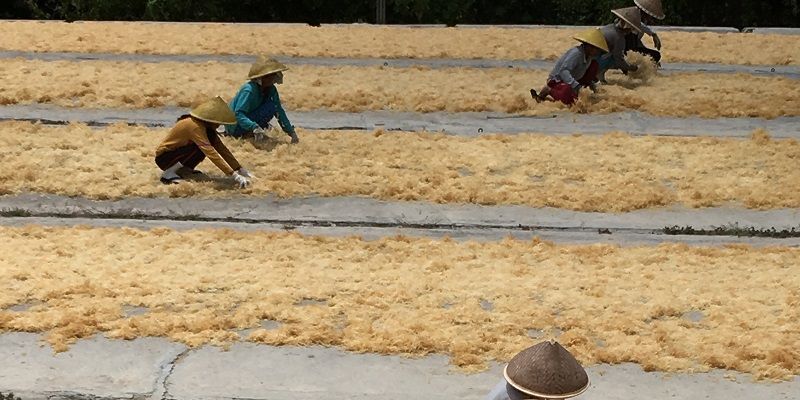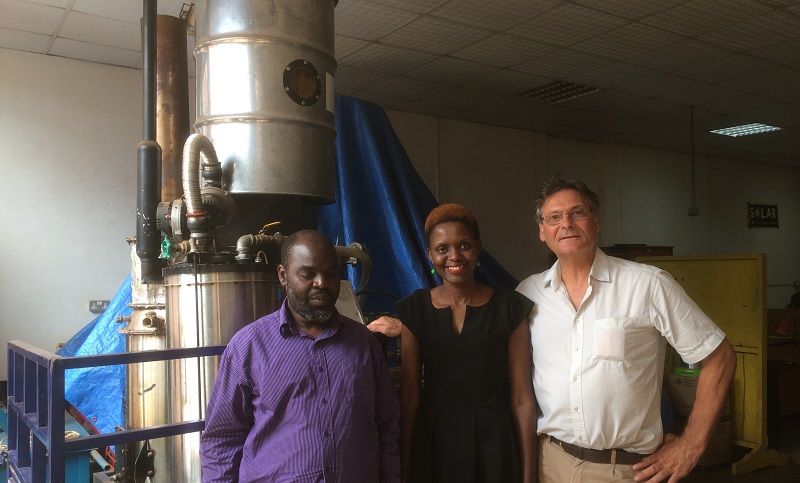
Tapping into the myriad uses of plants and fungi could save people and the planet, says new report
University of Leeds researchers have joined forces with the Royal Botanic Gardens, Kew to conduct research into the plants and fungi that could be used as a source of energy as well as assessing the species with the potential to be scaled-up with innovative technologies.
This research forms part of a joint report highlighting the enormous potential for plants to produce energy and contribute towards achieving the UN's Sustainable Development Goals.
The State of the World’s Plants and Fungi report takes a deep dive into the state of the world’s plant and fungal kingdoms globally and shows how we are currently using plants and fungi, what useful properties we are missing, and what we risk losing.
It
brings together 210 scientists from 42 countries, including University of Leeds
researchers and their collaborators, led by Professor Jon Lovett from the School of Geography,
who is
Chair in Global Challenges and an Honorary Research Fellow at Kew.
The Leeds group collaborated with researchers in Africa, Indonesia, Nepal, India and Mexico on capacity building; exploring the potential for local plants and fungi to provide energy in small-holder farms; and developing new ways of creating bioenergy from invasive plants.
“Demand for energy is a cause for climate change and deforestation, but it doesn’t need to be this way. Plant power can be harnessed to provide renewable energy...”
Their work highlights that plants and fungi can make a huge contribution to reducing both carbon emissions and energy poverty.
 Seaweed
drying on Sumba Island, Indonesia. Seaweed is an important export for the food
industry and residue from processing is a potential source of bioenergy. Credit: Jon Lovett
Seaweed
drying on Sumba Island, Indonesia. Seaweed is an important export for the food
industry and residue from processing is a potential source of bioenergy. Credit: Jon Lovett
Renewable energy is part of Sustainable Development Goal (SDG) 7 which aims to “ensure access to affordable, reliable, sustainable and modern energy for all”, but also has strong impacts on the other SDGs, such as those relating to health and wellbeing.
For example, in many countries traditional wood fuel burning is still a major source of energy. However, not only is this an unstainable energy source and negatively impacts the environment through logging, it is a major cause of death and illness for women and children through indoor air pollution caused by smoke.
Good quality energy supply can tackle multiple SDGs and the report emphasises the untapped potential of plants to achieve this. It can also help to alleviate poverty by facilitating micro-enterprises such as food processing or powering lights and machinery.
Professor Lovett said: “It’s no longer enough for us botanists to simply draw attention to the horrific levels of biodiversity loss on the planet, we have to become part of the solution. Demand for energy is a cause for climate change and deforestation, but it doesn’t need to be this way. Plant power can be harnessed to provide renewable energy and create biodiverse energy gardens.
“The Leeds energy researchers and our partners from the global renewable energy community held a joint conference with Kew on Plant Power in June last year, it’s great to be coming together again in this prestigious conference.
“Extinction is avoidable. It’s up to everyone to take action.”
 Meeting in Kampala - left to right: Abdul Busulwa, Professor Lovett's former PhD student who is blind; Mary Suzan Abbo, Director of the Centre for Research in Energy and Energy Conservation at Makerere University; and Professor Lovett. The meeting focused on how to integrate with renewable energy revolution with the needs of
people with disabilities.
Meeting in Kampala - left to right: Abdul Busulwa, Professor Lovett's former PhD student who is blind; Mary Suzan Abbo, Director of the Centre for Research in Energy and Energy Conservation at Makerere University; and Professor Lovett. The meeting focused on how to integrate with renewable energy revolution with the needs of
people with disabilities.
In conjunction with the publication of the report, the Royal Botanical Gardens, Kew (RGB Kew) will host its first ever State of the World’s symposium focusing on both plants and fungi. This will take place from 13 – 15 October 2020. For more information, and to register for a free place, please click here.
Plants and fungi can provide sustainable energy for all
Dr Olwen Grace, Senior Research Leader at the Royal Botanic Gardens, Kew and lead author of the energy chapter said: “I think that energy poverty can be addressed sustainably within a decade if there is political will, given that we have a diverse pool of plants and fungi to explore and a vast array of suitable emerging technologies.
"There is real potential to harness the advances in engineering to support diverse, sustainable and resilient landscapes supporting the most essential human needs – food, water and energy.”
Dr Mary Suzan Abbo, Managing Director of Centre for Research in Energy and Energy Conservation, Makerere University, Uganda said: “Every year, as a result of unsustainable wood and charcoal burning in Uganda, thousands of hectares of forest are lost, and thousands of people suffer from smoke inhalation.
"International collaboration can help us to identify the plants and fungi that will make clean, sustainable energy accessible to everyone. Biofuel technologies have the potential to support both biodiversity and human life.”
Further information:
The State of the World’s Plants and Fungi Report is available on the Royal Botanic Gardens, Kew website.
Plant Power: Opportunities and challenges for meeting sustainable energy needs from the plant and fungal kingdoms is published in the journal Plants, People, Planet (DOI: 10.1002/ppp3.10147)
Further information on the State of the World's Plants and Fungi Virtual Symposium can be found online.
The United Nations Summit on Biodiversity will be convened by the President of the General Assembly on 30 September 2020, at the level of Heads of State and Government under the theme of “Urgent action on biodiversity for sustainable development.” https://www.cbd.int/article/2020-UN-Biodiversity-Summit
Leeds Clean Energy Research Alliance (CERA)
The Clean Energy Research Alliance (CERA) is a group of internationally-based researchers. Our interdisciplinary projects focus on renewable energy and sustainable development in low-middle income countries. We currently have partners across Africa and Asia. https://cera.leeds.ac.uk/